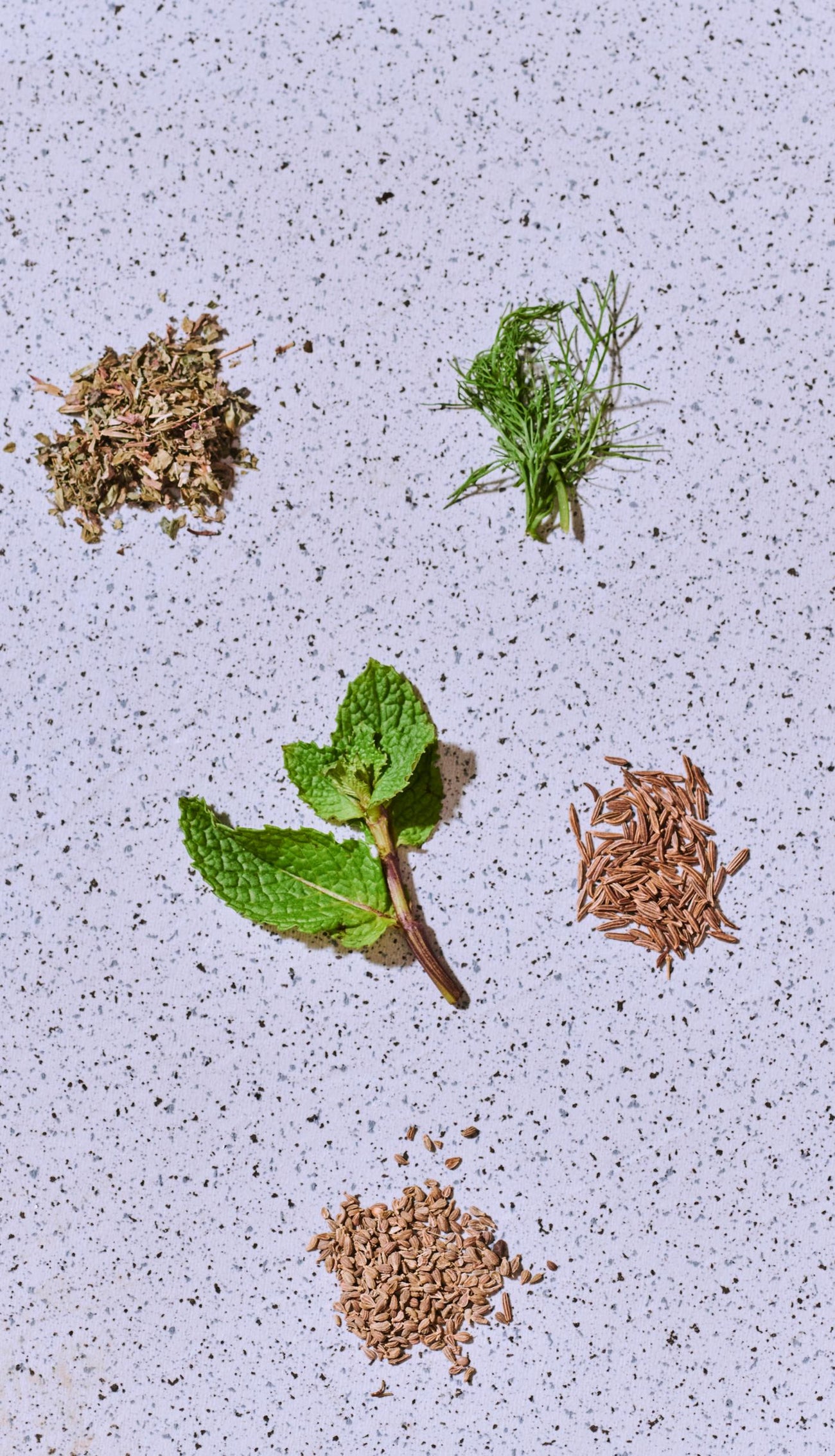
Ajwain, also called carom seeds, is a popular spice in Indian cuisine. The plant produces small seeds, similar to caraway and cumin. Ajwain belongs to the Apiaceae family, which includes caraway, coriander, fennel, celery, and parsley. The seed is known as a digestive aid with antimicrobial and anti-inflammatory constituents (1).
The History
The plant grows in arid regions of central Europe, Asia, India, Iran, Iraq, Afghanistan, and Pakistan. In Persia, ajwain was a staple in traditional medicine for digestive disorders, respiratory issues, and even arthritis. It was so valued that it became a key part of medical texts and remedies passed down through generations.
In India, ajwain has been used in Ayurveda for thousands of years, where it is prized for its ability to balance the doshas, especially Vata and Kapha. It is considered to hold warming qualities, making it ideal for balancing cold conditions associated with Vata. It is believed to stimulate Agni, or the digestive fire, improving overall metabolism and the body's ability to process food. And its ability to stimulate digestion helps reduce sluggishness and heaviness in the body associated with Kapha. It was often consumed to relieve indigestion, bloating, and respiratory conditions. Over time, it became a regular part of Indian cuisine, integrated into foods not only for its flavor but also for its medicinal properties. These traditional uses have been integrated into modern-day herbal practices, with ajwain featured in digestive blends, teas, and formulations designed to restore balance in the body.
The use of ajwain spread along ancient trade routes, particularly through Central and South Asia, the Middle East, and parts of North Africa. As its value as a spice and medicinal herb became known, it was incorporated into the cuisines and medicinal practices of different cultures. In some cultures, it was believed to have protective properties against evil spirits or bad energy.
In more recent centuries, ajwain has remained a staple in many parts of the world, especially India, Iran, Iraq, Afghanistan, and Pakistan. The seeds of Ajwain (C. copticum) are often added to recipes for its strong bitter flavor. Or alternatively, many use ajwain as part of a post-meal ritual, chewing a few seeds to aid digestion. Its medicinal value has gained recognition globally, and it continues to be used in both traditional remedies and modern herbal supplements.
The Research & Science
While traditional medicine has long lauded ajwain's benefits, modern scientific research has begun to uncover the mechanisms behind its effectiveness. In addition to its digestive benefits, emerging studies have explored ajwain's broader health potential.
- Anti-ulcer: An animal study found an extract from ajwain to be as effective as a proton-pump inhibitor in the treatment of peptic ulcers (2). Proton-pump inhibitors may more familiarly be recognized as Prilosec (Omeprazole) or Prevacid (Lansoprazole). The research suggested that the anti-ulcer effect of the plant was possibly due to its antioxidant effect.
- Anti-constipation: Another animal study found the seeds to help reduce the transit time of food in the GI tract (3). What does this effect mean? Food is not stalled, suggesting proper digestion and reducing the likelihood of constipation.
- Antimicrobial: Additionally, ajwain carries antimicrobial properties. Thymol and carvacrol are two essential oils within ajwain. These oils can help combat the growth of harmful bacteria and fungi (4). In the age of antibiotic resistance, natural antimicrobials are gaining attention. Ajwain's essential oils have demonstrated efficacy against several strains of bacteria and fungi, including E. coli and Candida species. These properties make ajwain a candidate for inclusion in natural antimicrobial products, such as wound care formulations and oral health products.
- Antioxidant: Ajwain has also been studied for its antioxidant properties, which are essential in combating oxidative stress—damage that can lead to chronic diseases like heart disease, diabetes, and even cancer. The seeds are rich in antioxidants, which neutralize harmful free radicals in the body. This antioxidant action also helps protect the gastrointestinal lining, reducing the risk of ulcers, gastric irritation, and other digestive problems. Ongoing research is examining whether regular consumption of ajwain could play a role in preventing oxidative damage linked to aging and disease (5).
- Anti-inflammatory: Ajwain contains bioactive compounds that may reduce inflammation at the cellular level. This has implications not only for digestive health but also for conditions such as arthritis and inflammatory bowel disease (IBD). Studies suggest that ajwain's essential oils, particularly thymol, can help reduce inflammatory markers, offering a natural alternative to some anti-inflammatory drugs (5).
The Benefits
Ajwain seeds are often used as a remedy for indigestion, bloating, and gas. They contain compounds like thymol, which may help relax the gastrointestinal tract's muscles and promote the expulsion of trapped gas, providing relief from discomfort. Through this relief, ajwain is also known to alleviate symptoms of acidity and heartburn. Thymol additionally contains antioxidants, which can help protect the gastrointestinal lining from oxidative stress and inflammation. (6)
Modern Applications
Ajwain has found several modern applications beyond its traditional uses, especially due to its health-promoting properties. Here are some notable ones:
- Digestive Aids and Supplements: Ajwain is used in over-the-counter digestive products like tablets. It's valued for its ability to relieve indigestion, bloating, and gas. Many modern herbal supplements incorporate ajwain for its ability to promote gut health and soothe gastrointestinal discomfort. Ajwain-based herbal teas have also grown in popularity, particularly for individuals looking for natural solutions to digestive discomfort. These teas are often marketed as detoxifiers or digestive aids, sometimes blended with other digestive herbs like fennel and ginger.
- Antimicrobial and Antifungal Products: Thanks to its essential oils, thymol and carvacrol, ajwain is included in natural antimicrobial formulations. These oils can be found in mouthwashes, antiseptic creams, or even natural cleaning products aimed at combating harmful bacteria and fungi.
- Essential Oils and Aromatherapy: Ajwain oil is used in aromatherapy for its strong scent and supposed ability to relieve respiratory issues like asthma or bronchitis. It can also be applied topically (in diluted forms) to alleviate muscle pain or swelling due to its anti-inflammatory properties.
- Mouthwash and Foot creams: In the world of personal care products, ajwain is starting to appear in formulations for oral hygiene, such as natural toothpaste and mouthwashes. Its antimicrobial and anti-inflammatory properties make it effective in promoting gum health and reducing bad breath. Similarly, ajwain oil is sometimes included in skin care products aimed at soothing inflammation, reducing acne, and treating fungal infections like athlete's foot.
- Food preservative: Beyond personal care, ajwain is also finding a place in the food industry as a functional ingredient. Manufacturers are exploring its potential as a natural preservative due to its antimicrobial qualities. Ajwain extracts may soon be seen in packaged foods as a natural means to extend shelf life and prevent spoilage.
These modern applications take advantage of ajwain's therapeutic properties in more convenient, accessible forms.
Precautions
Ajwain is generally considered safe when used in small amounts in cooking, but there are a few precautions and potential side effects to be aware of, especially with medicinal or high-dose use:
- Allergic Reactions: Some people may experience allergic reactions to ajwain, particularly those sensitive to plants in the Apiaceae family (like cumin, celery, or fennel). Symptoms could include skin rashes, itching, or respiratory discomfort.
- Gastrointestinal Irritation: While ajwain is typically used to alleviate digestive issues, excessive consumption might irritate the stomach or lead to heartburn in some individuals, due to its strong, bitter compounds.
- Pregnancy: Pregnant women are advised to avoid large doses of ajwain. Some sources suggest that ajwain may stimulate uterine contractions, potentially leading to complications.
- Liver and Kidney Concerns: High doses of thymol, a compound in ajwain, might strain the liver or kidneys over time. It's important to avoid prolonged use in large quantities without medical supervision.
- Interaction with Medications: Since ajwain has potential effects on digestion and gut motility, it may interact with medications, particularly those that affect digestion, such as such as antacids or proton pump inhibitors. Its ability to stimulate digestive secretions could counteract the effects of these drugs, leading to unintended side effects. Consult a healthcare professional before combining ajwain with medications.
It's always recommended to use medicinal plants in moderation and under supervision, especially if you're combining them with other medications.
Take Away
Incorporating ajwain into your routine can be a simple yet effective way to enhance your digestion and overall health. Whether you're adding it to dishes, consuming it as part of a tea, or using it in modern herbal supplements, ajwain's versatility makes it a valuable addition to both culinary and wellness practices. With its rich history and growing body of scientific support, ajwain continues to stand out as a spice with potent health benefits.
Sources
- National Library of Medicine
- Times of India
- Animal Study - Nutrition Research
- WebMD - Ajwain
- Science Direct - Ajwain
- Hindawi Assessment of Antioxidant Benefit of Carom
This information is for educational purposes only and should not be taken as medical advice. Please consult a physician before treating any disorder.



